Hummingbird Food: Sugar Water for Hummingbirds 101
Updated: Jun. 28, 2024
Learn how to make sugar water for hummingbirds. Get the hummingbird sugar water recipe and ratio to make your own hummingbird food.
On This Page
Hummingbird Sugar Water Ratio and Recipe
If you haven’t memorized the hummingbird food recipe yet, then now is the time. Here’s how to make your own sugar water for hummingbirds.
- One cup hot water
- 1/4 cup white table sugar
- Here’s the ratio: Combine four parts hot water to one part sugar. (Do not use honey, brown sugar or artificial sweeteners in your hummingbird mixture).
- Mix it up until the sugar is completely dissolved.
- Once it cools to room temperature, it’s ready.
- Store any extra sugar water in the refrigerator for up to a week.
Birds & Blooms reader William Toth asked birding experts Kenn and Kimberly Kaufman, “Who determined that 1-to-4 was the correct ratio of sugar to water for hummingbird feeders? They seem to use up so much energy, so I wonder if a richer mixture would help or harm them?”
Kenn and Kimberly say, “The standard recipe came from the idea that a ratio of 1-to-4 (about 1/5 or 20%) mimics the natural sugar concentrations in flower nectar. But in fact, some popular hummingbird flowers have higher sugar concentrations in their nectar.
Based on advice from hummingbird expert Sheri Williamson, we’d say it’s OK to vary the recipe a little. A richer mix, with one part sugar to three parts water, could be good in cold weather when the birds might need more energy. In hot, dry weather, it’s best to stick with the standard 1 part sugar to 4 parts water. Always use refined white sugar, and don’t add red coloring to the mix.”
Do I Need to Boil Sugar Water for Hummingbirds?
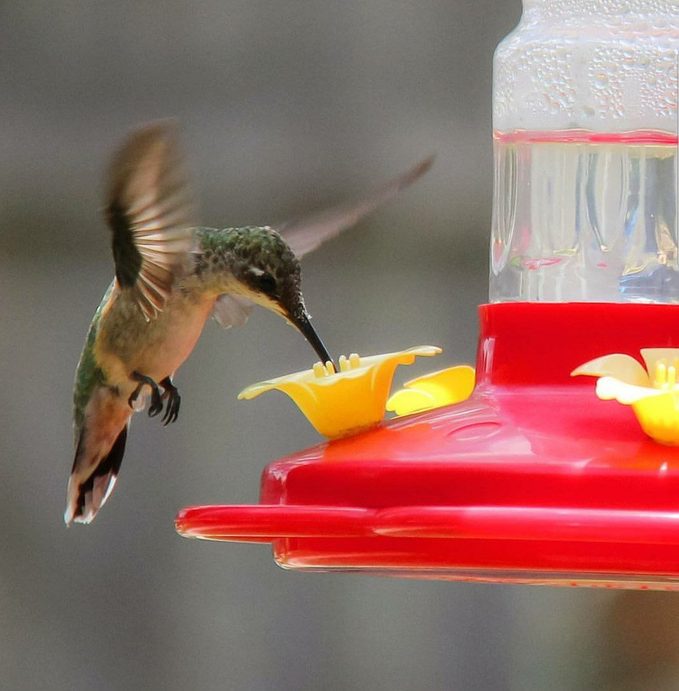
“Is it necessary to boil the sugar water mixture for hummingbird feeders? I just stir until the sugar is dissolved. I’ve always wondered if it’s safe to make my hummingbird food recipe without boiling,” asks Amy Kernes of Brea, California.
Kenn and Kimberly say, “Opinions differ on the importance of boiling the hummingbird food mixture. We always do boil the water to neutralize some impurities that might be in the water or sugar. Besides, sugar dissolves more easily in hot water.
But as soon as the feeder is outdoors, contaminants will get into the water anyway, brought by hummingbirds, insects or just a breeze. So at best, boiling the mixture keeps it fresh a little longer. If your water is good and your time is limited, washing the feeder thoroughly and often is more important than boiling the sugar water mixture.”
Will butterflies visit a sugar water feeder?
Using really hot water will usually suffice to dissolve the sugar. However, if you plan on making extra hummingbird sugar water to store in the fridge or you have so-so water quality, then it’s best to boil.
Check out your questions about hummingbird feeders answered by experts.
Stick to White Sugar for Hummingbird Food
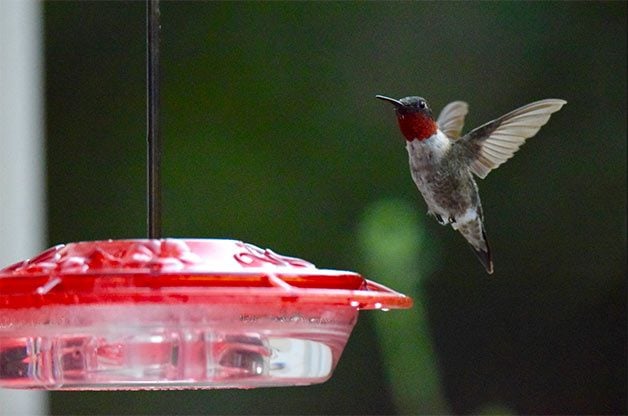
It’s always best to stick with real white sugar in your hummingbird feeders. Say no to sugar substitutes and brown sugar.
Don’t Add Honey to Hummingbird Food
Some people like to come up with creative ways to sweeten sugar water for hummingbirds water without sugar, and the most common stand-in is honey. Honey can make your sugar water mixture ferment more quickly. Skip the honey, and stick to white sugar.
Learn how to create an ideal hummingbird habitat.
Skip Red Food Coloring in Hummingbird Sugar Water
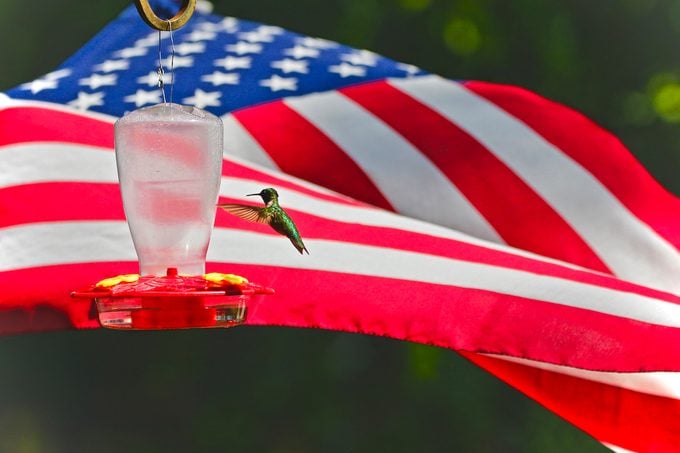
Though hummingbirds are attracted to red, clear sugar water works just fine—skip the red dye. The birds will still find your feeders. Even though every bird expert seems to agree that you don’t need red dye, people still add it to their sugar water. If this is you, don’t feel bad—but it’s time to break this habit once and for all. You don’t need red water to attract hummingbirds. In fact, the food coloring could be bad for the birds.
Psst—hummingbirds love red flowers.
Consider Pre-Made Hummingbird Food Mixtures
Some stores also sell pre-made hummingbird food, which can be a convenient time-saver. You will also see companies offering pre-made hummingbird sugar water that is red. Make sure to avoid these and any hummingbird food made with additives or artificial colors.
Check out jaw-dropping facts about hummingbirds,
Keep Sugar Water for Hummingbirds Clean
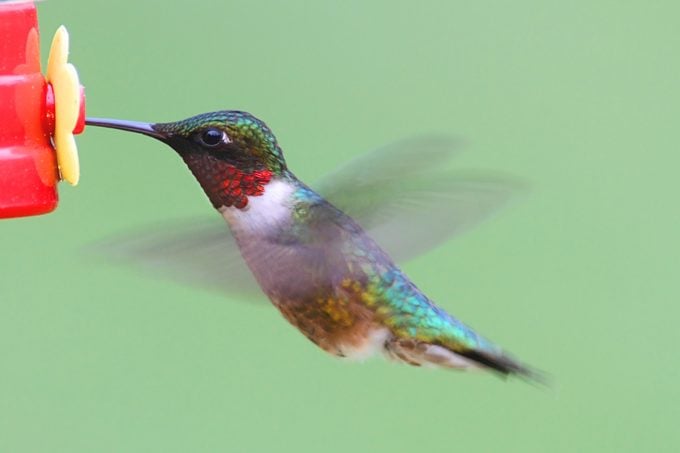
Hummingbird sugar water eventually goes bad, unless you’re lucky enough to have a busy feeder that the hummingbirds quickly empty. You should be in the habit of changing it every few days or even sooner if it’s really hot outside. Also, don’t forget to clean bird feeders regularly. Mold can collect, so you want to make sure you’re offering hummingbirds clean, safe sugar water.
Placing feeders in shady areas may slow down the growth of gunk, too, but you should still refill with fresh hummingbird food regularly. If the feeder is empty, the birds will look for food somewhere else.
Need clever tips for cleaning the nooks and crannies of hummingbird sugar water feeders? Our readers can help.
- “I rinse my feeders with vinegar, and they stay clean. I rinse them every time I change the food. It’s so easy and works well,” says Mattie Stillwell of Tenaha, Texas.
- “I keep a box of parakeet gravel on hand to clean my feeders. Put a couple teaspoons in the feeder with warm water, then swirl and rise. It cleans the toughest mold,” says Sally Brovold Kulm of North Dakota.
Learn how hummingbirds use their tongues and beaks.
When to Start and Stop Feeding Hummingbird Food
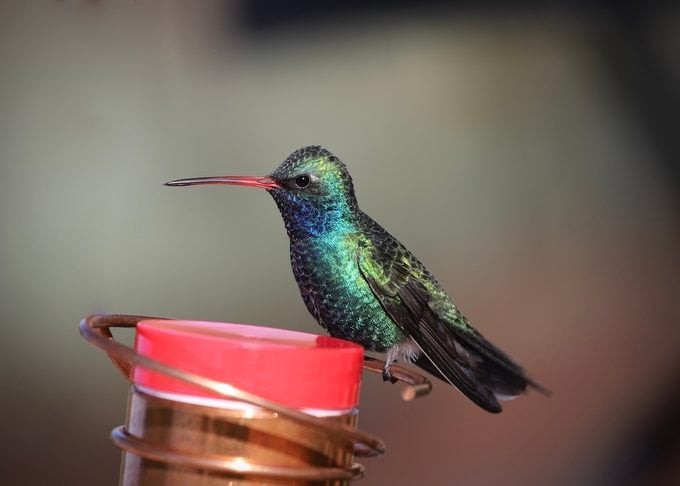
In spring, hummingbirds reach the Gulf Coast by late February or March. They typically arrive in northern states by mid-May. As hummingbirds move south in late summer and early fall, they need food sources to fuel their migration. Males tend to start the trek first, sometimes heading south as early as July.
To make sure you feed any stragglers, a good rule of thumb is to leave your feeders up for a week or two after you see the last hummingbird pass by. In milder climates, you may have hummingbirds all winter!
Choose Sugar Water Feeders Wisely
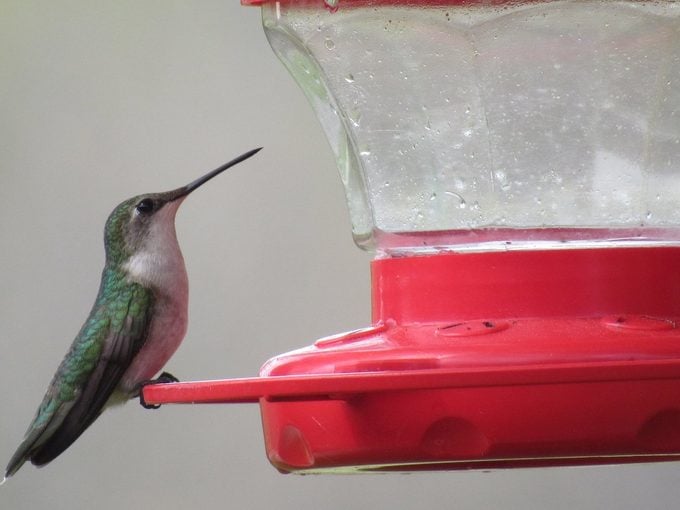
Attracting hummingbirds is easy when you cater to their sweet tooth with hummingbird food. A sugar water feeder is the quickest way to jump-start your hummingbird haven. When selecting a feeder, pick one with a wide opening to make cleaning easy. Scrub it once every few days, more often in hot weather.
And look for red! Hummingbirds are particularly drawn to the color, so choose a basic red plastic feeder from any birding store or online. Choose one with a built-in ant moat and yellow bee guards to keep the pests away and your fast flying guests safe.
Look for a feeder with perches to give hummers opportunities for a brief rest, but keep in mind that orioles—also sugar-water lovers— may stop by, too.
Add a Second Hummingbird Feeder

It can be helpful to offer more than one feeder because hummingbirds can get protective or territorial in summer. Add another sugar water feeder in late summer when migration increases. This will help keep territorial male hummingbirds from fighting for space.
Hang feeders in a couple of different locations. Always clean your hummingbird feeders at least once a week. This is another reason some people like to have an extra set of feeders to swap out.
How do hummingbirds find feeders?
Block Bugs from Sugar Water for Hummingbirds
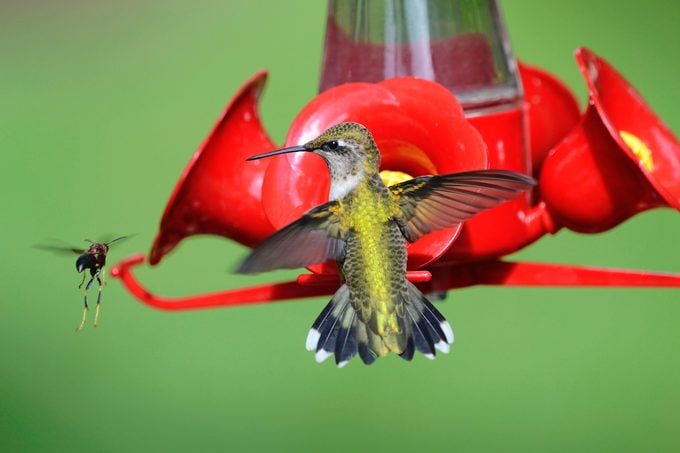
Certain insects, like yellow jackets and ants, are drawn to sugar water. To help keep them at bay, install nectar guard tips or ant moats. Also hang feeders in shadier spots to discourage bees from taking over, as they prefer sunny locations.
About the Experts
Kenn and Kimberly Kaufman are the official bird experts for Birds & Blooms. They are the creators of the Kaufman Field Guide series and they lead birding trips all over the world.
Sources
A Field Guide to Hummingbirds of North America by Sheri L. Williamson




















